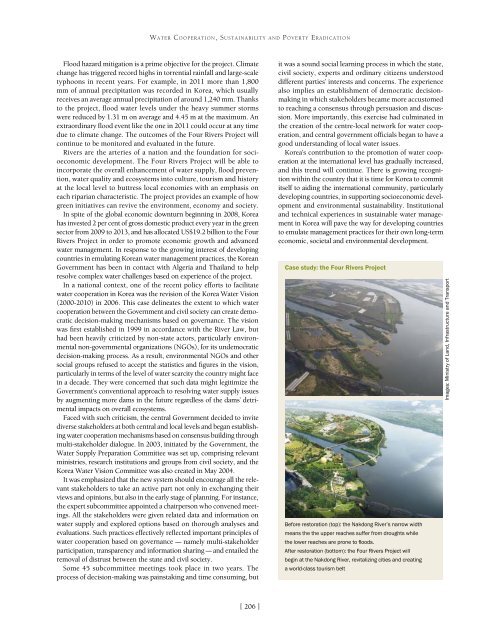222893e
222893e
222893e
You also want an ePaper? Increase the reach of your titles
YUMPU automatically turns print PDFs into web optimized ePapers that Google loves.
WATER COOPERATION, SUSTAINABILITY AND POVERTY ERADICATIONFlood hazard mitigation is a prime objective for the project. Climatechange has triggered record highs in torrential rainfall and large-scaletyphoons in recent years. For example, in 2011 more than 1,800mm of annual precipitation was recorded in Korea, which usuallyreceives an average annual precipitation of around 1,240 mm. Thanksto the project, flood water levels under the heavy summer stormswere reduced by 1.31 m on average and 4.45 m at the maximum. Anextraordinary flood event like the one in 2011 could occur at any timedue to climate change. The outcomes of the Four Rivers Project willcontinue to be monitored and evaluated in the future.Rivers are the arteries of a nation and the foundation for socioeconomicdevelopment. The Four Rivers Project will be able toincorporate the overall enhancement of water supply, flood prevention,water quality and ecosystems into culture, tourism and historyat the local level to buttress local economies with an emphasis oneach riparian characteristic. The project provides an example of howgreen initiatives can revive the environment, economy and society.In spite of the global economic downturn beginning in 2008, Koreahas invested 2 per cent of gross domestic product every year in the greensector from 2009 to 2013, and has allocated US$19.2 billion to the FourRivers Project in order to promote economic growth and advancedwater management. In response to the growing interest of developingcountries in emulating Korean water management practices, the KoreanGovernment has been in contact with Algeria and Thailand to helpresolve complex water challenges based on experience of the project.In a national context, one of the recent policy efforts to facilitatewater cooperation in Korea was the revision of the Korea Water Vision(2000-2010) in 2006. This case delineates the extent to which watercooperation between the Government and civil society can create democraticdecision-making mechanisms based on governance. The visionwas first established in 1999 in accordance with the River Law, buthad been heavily criticized by non-state actors, particularly environmentalnon-governmental organizations (NGOs), for its undemocraticdecision-making process. As a result, environmental NGOs and othersocial groups refused to accept the statistics and figures in the vision,particularly in terms of the level of water scarcity the country might facein a decade. They were concerned that such data might legitimize theGovernment’s conventional approach to resolving water supply issuesby augmenting more dams in the future regardless of the dams’ detrimentalimpacts on overall ecosystems.Faced with such criticism, the central Government decided to invitediverse stakeholders at both central and local levels and began establishingwater cooperation mechanisms based on consensus building throughmulti-stakeholder dialogue. In 2003, initiated by the Government, theWater Supply Preparation Committee was set up, comprising relevantministries, research institutions and groups from civil society, and theKorea Water Vision Committee was also created in May 2004.It was emphasized that the new system should encourage all the relevantstakeholders to take an active part not only in exchanging theirviews and opinions, but also in the early stage of planning. For instance,the expert subcommittee appointed a chairperson who convened meetings.All the stakeholders were given related data and information onwater supply and explored options based on thorough analyses andevaluations. Such practices effectively reflected important principles ofwater cooperation based on governance – namely multi-stakeholderparticipation, transparency and information sharing – and entailed theremoval of distrust between the state and civil society.Some 45 subcommittee meetings took place in two years. Theprocess of decision-making was painstaking and time consuming, butit was a sound social learning process in which the state,civil society, experts and ordinary citizens understooddifferent parties’ interests and concerns. The experiencealso implies an establishment of democratic decisionmakingin which stakeholders became more accustomedto reaching a consensus through persuasion and discussion.More importantly, this exercise had culminated inthe creation of the centre-local network for water cooperation,and central government officials began to have agood understanding of local water issues.Korea’s contribution to the promotion of water cooperationat the international level has gradually increased,and this trend will continue. There is growing recognitionwithin the country that it is time for Korea to commititself to aiding the international community, particularlydeveloping countries, in supporting socioeconomic developmentand environmental sustainability. Institutionaland technical experiences in sustainable water managementin Korea will pave the way for developing countriesto emulate management practices for their own long-termeconomic, societal and environmental development.Case study: the Four Rivers ProjectBefore restoration (top): the Nakdong River’s narrow widthmeans the the upper reaches suffer from droughts whilethe lower reaches are prone to floods.After restoration (bottom): the Four Rivers Project willbegin at the Nakdong River, revitalizing cities and creatinga world-class tourism beltImages: Ministry of Land, Infrastructure and Transport[ 206 ]


